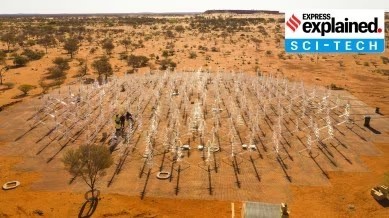
Square Kilometer Array project

11.01.2024
Square Kilometer Array project , Daily Current Affairs , RACE IAS : Best IAS Coaching in Lucknow
|
For Prelims:About the Square Kilometer Array, key Point, Benefits that would flow for India |
Why in the news?
Recently, India had decided to formally join the Square Kilometer Array (SKA) project, an international scientific collaboration working to build the world’s largest radio telescope.
Key Point
India has approved nearly Rs 1,250 crore for the project, which includes its funding contribution for the construction phase.
About the Square Kilometer Array:
- The Square Kilometer Array will not be a single large telescope but a collection of thousands of dish antennas operating as a single unit.
- The name, Square Kilometer Array, comes from the original intention to create one square kilometre (one million square metre) of effective area for collecting the radio waves.
- This was meant to be achieved by installing thousands of smaller antennas in a specific array design that would make them function like a single radio telescope.
- The antennas, about 200 of them are in South Africa and more than 130,000 are in Australia, being installed in sparsely populated locations.
- The sites are chosen to ensure they are as far away from human activities as possible.
- This has been done in order to minimise signal interference from undesirable Earth-based sources.
- Once operational, SKA would be between 5 to 60 times more powerful than the most advanced existing radio telescopes functioning in comparable range of frequencies.
Benefits that would flow for India:
- Even though none of the SKA facilities would be located in India, there are immense science and technology gains for the country by participating in the project as a full member.
- In this regard, SKA offers opportunities similar to the LHC or the ITER, which too are located on foreign soil but have brought rich benefits to the Indian scientific community.
- A full member status would provide India preferential access to the SKA facilities.
- The SKA would work on highest-end technologies, including electronics, software, material science and computing.
- The intellectual properties generated by the project, though owned by the SKA Observatory, would be accessible to all the member countries.
- This can offer huge learning opportunities for scientists, academics and even private industry.
Source:Indian Express